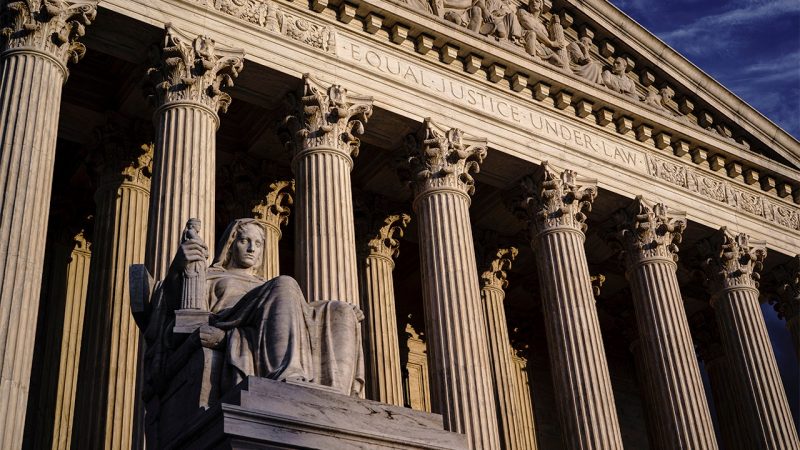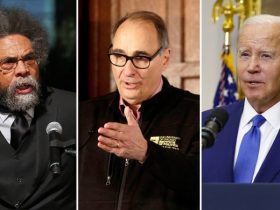The Supreme Court heard oral arguments on Wednesday in a case that could have huge implications for how state lawmakers can – or cannot – draw congressional maps.
After the North Carolina State Supreme Court rejected the map drawn by the legislature for unfairly benefiting Republicans and ordered a new one, lawmakers challenged the decision by arguing that the court was taking power away from them.
At issue is whether a state court can knock down state election regulations and put in place its own regulations, as the North Carolina court did. The lawmakers, led by Timothy Moore and represented by attorney David Thompson, claim that only a state’s legislature can regulate elections based on the U.S. Constitution’s Elections Clause. This is what has been dubbed the ‘independent state legislature’ theory of elections.
‘The Times, Places and Manner of holding Elections for Senators and Representatives, shall be prescribed in each State by the Legislature thereof,’ the clause says, and Thompson pointed out that the Constitution specifically mentioned the legislature and not the state in general.
The state court based its rejection of the legislature’s map on a clause in the state constitution that says, ‘All elections shall be free.’
Justice Ketanji Brown Jackson challenged Thompson, asking how he can ‘cut the state constitution out of the equation,’ given that the document is the source of the legislature’s power in the first place.
Justice Sonia Sotomayor claimed that Moore’s independent state legislature position ‘gets rid of the normal checks and balances’ of government. She argued that in such a case, there would be ‘no remedy’ available even in the event of extreme gerrymandering.
Thompson disputed this, noting there would still be checks and balances in the U.S. Constitution and acts of Congress.
Attorney Neal Katyal, arguing on behalf of the organization Common Cause, accused Moore’s position of being so sweeping its effects would be unprecedented.
‘Frankly, I’m not sure I’ve ever come across a theory in this court that would invalidate more state constitutional clauses as being federally unconstitutional – hundreds of them, from the founding to today,’ he said.
U.S. Solicitor General Elizabeth Prelogar also argued against Moore. She argued that while the state legislature has the power to set election regulations, the state’s laws must comport with the state’s constitution.
Chief Justice John Roberts noted, however, that the state legislature’s power over elections is not derived from the state constitution but from the federal one, which makes the case more complex than Prelogar made it out to be.
The Supreme Court has never officially recognized the independent state legislature theory. It appeared in a concurring opinion from then-Chief Justice William Rehnquist in 2000’s Bush v. Gore, but as Justice Elena Kagan noted on Wednesday, that was merely a concurring opinion that does not hold the weight of precedence.
The Supreme Court earlier this year allowed North Carolina’s court-drawn plan to go into effect for the November midterms while the case was still being litigated. The state’s legislature is controlled by Republicans but has a Democratic governor and attorney general. So various state officials were in the unusual position of offering conflicting constitutional interpretations at argument.
Resolution of this and similar disputes in other states like Kentucky, Utah, Ohio, and New Mexico– controlled by a mix of Democrat- and Republican- legislatures– could have major implications for the 2024 elections and beyond.
In a 2021 election dispute from North Carolina, Roberts wrote in his majority opinion, ‘Provisions in state statutes and state constitutions can provide standards and guidance for state courts to apply.’ That would appear to doom application of the independent state legislature theory, although Roberts did at one point on Wednesday ask whether there were ‘narrow alternatives’ he and his colleagues could craft.
This could indicate a desire to reach a compromise that would preserve limited judicial review of state election laws without giving state courts free rein to change them.
A decision in the case is not expected until the latter part of the Court’s term in June.
Fox News’ Shannon Bream, Bill Mears, Haley Chi-Sing and Brianna Herlihy contributed to this report.






